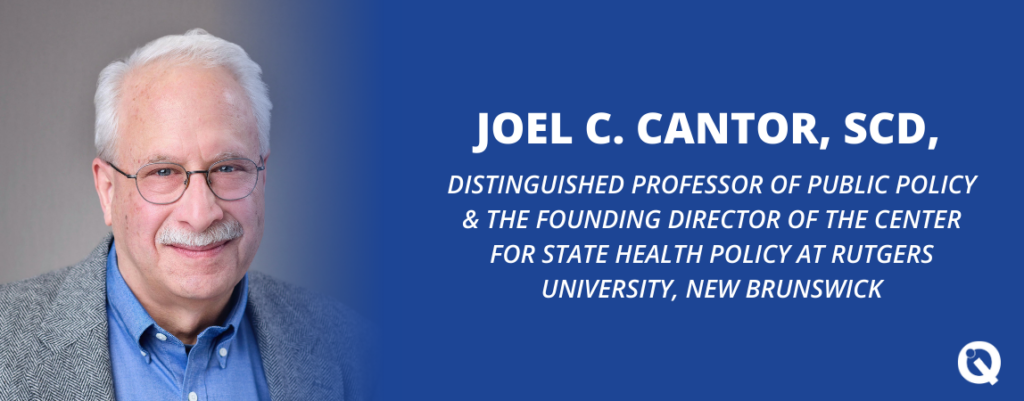The Center for State Health Policy, a member of the Quality Institute’s Education Council, is celebrating its 25th anniversary.
The Center works to provide rigorous research and to inform and support sound health care policy in New Jersey and around the nation. Can you describe the one area where the Center has the greatest impact on policy in New Jersey?
I feel like you’re asking me to pick which of my children are loved most. But, ok, I’ll give one example. In the early days of the center, we did a series of studies about the regulation and operations of the New Jersey individual health insurance market, which at the time was really failing. Our work was cited by the U.S. Solicitor General in Supreme Court arguments defending the Affordable Care Act. … I knew our work had impact when I walked into a meeting with a senior policy official from the New Jersey Department of Banking and Insurance and our technical report was dogeared and riddled with paperclips. That’s my happy place … knowing that policy makers use our research to support evidence-based decision making. In this case, changes in regulations stabilized a market that was really faltering. This was before the Affordable Care Act.
Why is translational research so important?
Translational research is using research tools to bring evidence into real world practice, whether it’s medical practice or, in our case, informing legislation or policies and initiatives. Researchers are good at communicating with each other. We write these esoteric articles; we present at conferences; we debate. But that’s not what policymakers are looking for. They think of the issues they face in real and practical terms, which are completely different than the language researchers use. So, without the translational piece, all the work that even the best policy researchers do is not helpful — except for maybe getting someone tenure. It’s important that we can speak to decision makers in the language that they use and not academic jargon.
If you had to name a significant change in New Jersey’s policy environment over the past 25 years, what would it be?
There are many important changes that have occurred over the years, but New Jersey, like all states, is not in the position to pay the whole bill or overcome the obstacles that federal laws and regulations put in place. So, within that context, if I had to name one thing that’s been most important in the last 25 years, it would be the Affordable Care Act, which gave New Jersey and other states a broad range of tools to address health care affordability, access and quality. It’s quite comprehensive and it put a lot of power in the hands of state decision makers. And New Jersey has done a great job making the most of those opportunities.
As a follow-up, will the recent presidential election impact the Affordable Care Act?
Yes. If past is prelude, I think what President-elect Trump said in the debate speaks volumes. He claimed credit, falsely, I would say, for saving the Affordable Care Act. I see that as a pivotal point, moving away from repeal and replace (even though they never really had clear replacement ideas) to the concept of, “I fixed it.” Now, even if that’s false, the statement creates sort of a permission structure to work incrementally. I think that repeal and replace is probably not going to be the mantra. I could be wrong. I’m not a political scientist.
Still, the next administration could greatly disrupt health care affordability and access. Even if they do nothing, millions of people across the country could lose their health insurance because there’s currently enhanced subsidies available that were put in place during the pandemic. The subsidies expire at the end of 2025. Without the subsidies, people who buy in the exchanges will see their premiums skyrocket and many will drop coverage.
What are you most proud of in your tenure as Founding Center Director?
Our greatest accomplishment is that we’ve really been a constant through all the change. We provide research that speaks truth to power and is impartial. That’s a legacy that’s important.
What’s next for the center?
I would say that history tells us that when the feds step back, which I think will happen, states step up. New Jersey policy makers and advocates and stakeholders are going to be working hard to preserve accomplishments and to move forward to sustain New Jersey’s reputation for sound state health policymaking. And that’s when good information can be most helpful. It’s the same role we’ve always had, but it’s going to be even more important, I think, in the coming years.

